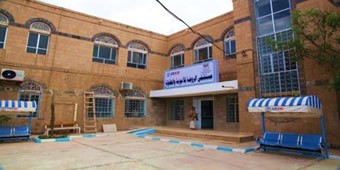
Today as Dr. AbduSamad Abu Taleb walks the halls of the Al Rawdah Hospital, he can finally smile. After 22 years as the hospital manager, he is seeing the buildings and equipment get an upgrade thanks to a USAID-funded renovation of his Sana’a-based hospital.
The Al-Rawdah Hospital, in the highly populated northern part of Yemen’s capital, was first constructed in 1967 as a dispensary. It evolved into a hospital in the 1990s. In 2005, a new building was constructed to serve as the maternity wing, but it fell short of its intended purpose.
“It was just a building with simple rooms. Despite its name, it was just a health center,” says Abu Taleb. “We were serving people without any facilities. We offered a very limited service—just vaccinations and routine examinations. We had to ask our patients to go elsewhere for many things.”
In just under three months during summer 2013, the Al Rawdah Hospital received a much-needed renovation and upgrade. The hospital now has a proper and fully equipped operation room, intensive care unit, sterilization rooms and a pediatric laboratory, among other renovated facilities.
USAID also provided state-of-the-art medical machinery and equipment that now allow the Al Rawdah Hospital to offer a full range of maternal and child health services, including emergency obstetric care, and maternal and neonatal care services.
”The renovation work does not just meet [basic] standards,” says Abu Taleb. “We now have a very presentable and modern hospital. About 2,000 people have visited under our promotion plan and they could not believe what they saw.”
But it wasn’t only a matter of infrastructure. The hospital also needed adequate service providers.
The Yemeni Government recognized that need, and it now provides the necessary budget to operate the hospital around the clock with a full staff of specialized doctors, anesthesiologists and nurses.
Abdulkader Ali Helal, mayor of Sana’a, even asked electricity officials to ensure that the hospital was powered from the city grid. The facility also now boasts a 280-kilowatt generator, enough to power a whole village.
The renovated hospital opened its doors to the public in early October 2013 and is now operating around the clock. This means improved maternal, newborn and child health services for nearly 1 million Yemenis living in the five surrounding districts. It also means the end of traveling to faraway hospitals for basic health-care services.
Abu Taleb knows how much good these renovations provide his fellow Yemenis. After 22 years of waiting, it is enough to put the spring back in his step as he walks through the hospital every day.
“Even the most cynical people I know couldn’t find fault in the renovations,” Abu Taleb says happily.







Comment
Make a general inquiry or suggest an improvement.